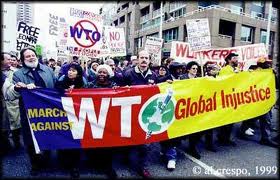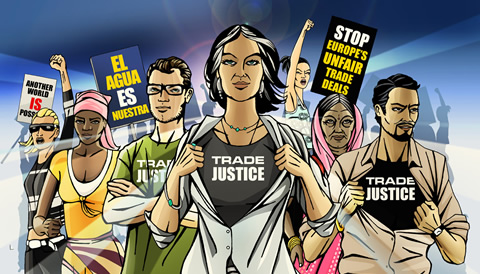 It is generally the nations that are economically dominant that push for free trade because they are able to ensure that they will reap the benefits. In the nineteenth century when Britain was a leading industrial power, it was also ‘the most vigorous proponent of free trade’, utilizing the arguments of Adam Smith and his followers to make their case. In the late 1940s, following the war, half of the world’s production was being produced in the US and it was the US that dominated the push for free trade. Throughout the following decades the US government pressured US allies to allow free trade and made its loans to other nations dependent on facilitating policies that would suit the needs of US companies. These policies included the dismantling of European colonial empires and trade barriers, all with a view to establishing an international regime of free trade.
It is generally the nations that are economically dominant that push for free trade because they are able to ensure that they will reap the benefits. In the nineteenth century when Britain was a leading industrial power, it was also ‘the most vigorous proponent of free trade’, utilizing the arguments of Adam Smith and his followers to make their case. In the late 1940s, following the war, half of the world’s production was being produced in the US and it was the US that dominated the push for free trade. Throughout the following decades the US government pressured US allies to allow free trade and made its loans to other nations dependent on facilitating policies that would suit the needs of US companies. These policies included the dismantling of European colonial empires and trade barriers, all with a view to establishing an international regime of free trade.
The undemocratic nature of the GATT negotiations has ensured that the trade rules agreed to are skewed in favour of the more affluent nations that are pushing for free trade. Of the estimated $200 billion plus in benefits expected to be reaped from the Uruguay Round by 2005, less than 30 percent is likely to go to developing nations and most of that to a few nations in Asia and Latin America.
 According to the UK charity, Panos, most developing nations are likely to ‘to be worse off than before. Sub-Saharan Africa is expected to lose around US$1.2 billion a year from freer trade.’ This skewing of benefits is not only because poorer countries export less but also because ‘the most dynamic exports of developing countries’ remain the most protected.
According to the UK charity, Panos, most developing nations are likely to ‘to be worse off than before. Sub-Saharan Africa is expected to lose around US$1.2 billion a year from freer trade.’ This skewing of benefits is not only because poorer countries export less but also because ‘the most dynamic exports of developing countries’ remain the most protected.
Although the GATT holds free trade to be the ideal, it does allow many exceptions to the rules, particularly those preferred by the more powerful nations who are calling the shots. As a result, many subsidies, tariffs and ‘voluntary export restraints’ remain in place. Third-world nations have not only been disadvantaged by such protectionism, but also by the opening of markets in industrial goods in their own countries because they have not had a sustained opportunity to develop under a protective regime, as have more affluent countries. Panos notes:
Despite successive trade rounds, products in those sectors where developing countries have a comparative advantage still face high barriers in industrialised countries. These include textiles and clothing, vegetables and fish, processed foods, leather and rubber goods, cars and electronics. According to UNDP:
- Average tariffs on industrial country imports from developing countries are 10 per cent higher and for the least developed countries 30 per cent higher than the global average.
- Developing countries lose about US$60 billion a year from agricultural subsidies in the industrial nations and from the barriers they face on exports of textiles and clothing.
Activists from low-income countries have argued that free trade might be fair and mutually beneficial between equal partners—but not where there are large differences in economic power and stages of economic development. The analogy of a race between a poorly fed African child and a world champion sprinter has been used. Applying the same rules to each of them, so that they both start at the same time and run the same distance, would hardly be considered a ‘fair’ race. Similarly, free trade between high-income nations and nations with much less development that have been exploited by developed nations in the past, is not fair. It results in multinational corporations taking control of industries in low-income countries, and local companies being unable to develop and compete.